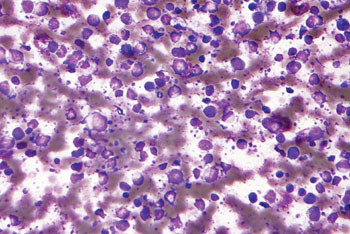Simple Assay Determines Lymphoma Subtypes Rapidly
By LabMedica International staff writers
Posted on 29 Apr 2015
Diffuse large B-cell lymphoma (DLBCL), the most common non-Hodgkin lymphoma, is subdivided into germinal center B-cell-like and activated B-cell-like subtypes, but these lymphomas are difficult to discriminate in routine diagnosis, impeding the development of treatments.Posted on 29 Apr 2015
These lymphomas are germinal center B-cell-like (GCB) and activated B-cell-like (ABC), which differs in management and outcomes, and with the advent of targeted lymphoma therapies on the horizon, it becomes increasingly important to differentiate the two major subtypes.

Image: Photomicrograph of a diffuse large B cell lymphoma of a fine needle aspirate specimen from a lymph node (Photo courtesy of Nephron).
Scientists at the University of Rouen (Mont-Saint-Aignan, France) evaluated the use of the reverse transcriptase multiplex ligation-dependent probe amplification (RT-MLPA) assay for differentiating DLBCL subtypes. RT-MLPA is as accurate as the current gold standard technology and offers advantages such as simplicity, flexibility, short turnaround time, low cost, and efficiency. They analyzed lymph node biopsies from 259 patients with de novo DLBCL, including 195 patients from the Centre Henri Becquerel (Rouen, France) and 64 from an external group.
The team developed a simple and rapid classifier based on a reverse transcriptase multiplex ligation-dependent probe amplification assay and 14 gene signatures, and compared it with the U133+2 GeneChip arrays (Affymetrix; Santa Clara, CA, USA) as the gold standard. In a training series of 50 randomly selected DLBCL cases, the new method classified 90% of the cases into the expected subtypes (20 GCB and 25 ABC), whereas 10% were considered unclassifiable. In a second independent validation series, 93% of 65 samples were classified correctly with RT-MLPA.
The investigators also showed that RT-MLPA is sensitive for analyzing archived formalin-fixed, paraffin-embedded (FFPE) tissue samples. Comparison of samples from paired frozen and FFPE biopsies showed that the RT-MLPA assay correctly classified 89.3% of 28 cases. To evaluate the prognostic value of the assay, the scientists looked at survival in 135 treated lymphoma patients diagnosed between 2001 and 2011. They found that patients determined to have the ABC subtype by the RT-MLPA assay had significantly worse progression-free survival and overall survival than those with the GCB subtype.
Philippe Ruminy, PhD, the lead investigator, said, “The robust and cost-effective RT-MLPA assay can yield results within one day and requires reagents costing less than USD 5 per sample. Since RT-MLPA utilizes materials and equipment that are standard in many laboratories, the process can easily be implemented for routine use.” The study was published in the May 2015 issue of the Journal of Molecular Diagnostics.
Related Links:
University of Rouen
Centre Henri Becquerel
Affymetrix













